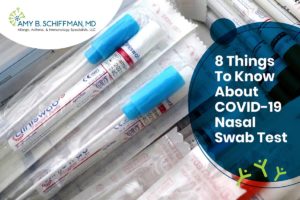What does a Nasal Swab Test for
The nasal or nasopharyngeal swab test is the most common test to detect coronavirus disease (COVID-19). It is conducted by a licensed and trained healthcare provider to ensure the proper collection of a specimen for cell culture, in order to result in an accurate diagnosis. Here are the eight things you should know about COVID-19 Nasal Swab test:
1. Nasal Swab Test Procedure
Healthcare providers conducting nasal swab tests must use a sterile dacron or rayon swab with a flexible, plastic shaft for deep nasal sampling. Cotton, calcium alginate swabs, or swabs with wooden sticks may contain such compounds that can inactivate some viruses and inhibit the diagnostic polymerase chain reaction (PCR). The following steps are the standard protocols in conducting a nasal swab test for COVID-19:
- The patient will enter the examination room.
- The physician will explain the process and obtain consent.
- The swab package containing a sterile swab will be opened and the swab removed.
- The patient will move their facemask to expose their nose.
- The patient will tilt their head back slightly to facilitate passage from the front of the nose to the nasopharynx. The swab will be gently inserted until it reaches the nasopharynx.
- The swab is rotated several times to collect the sample material.
- The swab is removed and inserted into a collection vial.
- The swab handle will be trimmed at the breakpoint so the vial may be closed.
- The vial will be labeled with necessary information such as the following:
- Collection date
- Patient’s name and date of birth
- Specimen type (e.g., nasal swab)
- Unique identifiers
- The sample will be collected by the laboratory for processing
Expect to feel uncomfortable since it will activate your lacrimal reflex, which will bring tears to your eyes. It may also feel as if you are underwater, which will dissipate in a few minutes. Less likely, a gag reflex may be triggered if the swab touches the back of your throat.
2. How Long is the Result of the Swab Test?
Results are usually available within 72 hours, but it may take longer due to the current levels of demand and volume at the lab.
3. Who Should Get Tested?
Consult your local healthcare provider about whether or not you need to get tested. You may also call your local health clinics, local hospitals, or health department for the availability of COVID-19 nasal swab tests. The Center for Disease Control and Prevention has a guide for who should get tested. The top of the priority lists are those who show symptoms of COVID-19, as well as individuals who meet the following criteria:
- Had a hospital admission
- Work at a healthcare facility, hospital or clinic
- Is a first responder
- Work or live in long-term care facilities or prison
- Have been in contact with someone positive for the virus
4. How to Get Tested?
Contact your doctor, or Dr. Schiffman’s office to schedule a COVID-19 nasal swab. For those with symptoms or recent exposure, a car swab is most appropriate.
5. When can I Get a COVID-19 Test?
Get tested as soon as possible if you are experiencing symptoms of COVID-19, or you were in contact with someone positive for the virus.
6. What if I Test Positive for the Coronavirus?
It means that you currently have the COVID-19 virus. Monitor your symptoms. Keep in contact with your doctor, and if you experience shortness of breath or worsening symptoms, present to the emergency department for urgent evaluation. For difficulty breathing, call 911 immediately.
Follow the steps listed below if you are advised to isolate at home, to avoid spreading the virus:
- Stay at home and don’t go out unless its a medical emergency
- Isolate yourself in a room, and stay away from people within the home
- No sharing of dishes, cups, eating utensils, or linens with others
- Practice respiratory etiquettes, such as covering your coughs and sneezes. Wear a face mask when not in isolation in your room
- Wash your hands often
- Clean and disinfect surfaces
7. Accuracy of COVID-19 Nasal Swab Tests
Nasal swab testing has higher accuracy in detecting the virus compared to other diagnostic tests. Laboratories use a specific type of nucleic acid test, which is called polymerase chain reaction or “PCR assay. It amplifies the genetic material of the coronavirus in the sample. The PCR assay can rapidly detect the presence of severe acute respiratory syndrome-associated coronavirus (SARS-CoV 2). Specimen quality and viral load, or how much coronavirus is present in the body, can affect the results.
The virus starts replicating in the upper respiratory tract upon exposure. The virus is typically present when a person starts showing symptoms, on average 5 days after exposure. Prior to demonstrating symptoms, the results may not be reliable, meaning it may be a false negative.
8. Chances of Getting a False-Negative Test Result
Note that negative results can occur in patients who are in the early stages of infection with no symptoms. A repeat test may be conducted for individuals later on as the virus increases to a detectable level in their body.
Where to Get Tested
Talk to a trusted healthcare provider for more guidance in regards to your symptoms. Dr. Amy Schiffman, an immunology and asthma specialist in Boca Raton, Florida, offers the COVID-19 Nasal Swab test in her clinic at 7100 Camino Real Suite 121, Boca Raton, Florida 33433.

